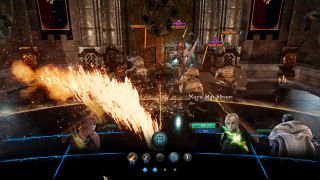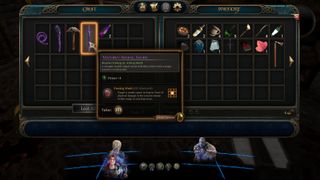Booze makes you a better wizard in The Bard's Tale 4's great RPG combat
You need to drink. Just don't drink too much—because there's a lot going on with this combat system, and it's a blast.

Here's what I love about the short alpha demo of The Bard's Tale 4, which I've now played through three times: there's no basic attack button, no block button, no scrolling through a long menu of spells to decide what to cast. Before The Bard's Tale 4, this is an accurate representation of what I'd do if you asked me what I thought about dungeon crawlers: ¯\_(ツ)_/¯. I adore NetHack and Darkest Dungeon and loads of other RPGs, but the combat-over-story approach of first person dungeon crawlers has always bored me.
I expect all this to get vastly more complex in the full game, when you'll be able to have a party of up to six adventurers.
The Bard's Tale 4 plays like no other dungeon crawler I've ever touched, blending bits of classic Bard's Tale and Japanese tactics RPGs into something new. It's not full of ideas that will shock you, but its approach to a genre that's now nearly 40 years old still feels mildly heretical. Most classic RPGs either don't care where your party is standing in combat or are best played with fairly codified formations (brawlers in the front, softies in the back). But constantly repositioning is the most crucial element of any encounter in Bard's Tale 4, and moving costs an action point just like an attack.
When I started planning out a whole turn in advance—who attacks then moves, who should end the turn on the front line, how a charged-up magic attack can trigger another ability—I knew developer inXile was working on something exciting, here.
Also, bards get more powerful when they drink, and will hurl an empty tankard at an enemy to deal one damage when they get angry drunk. Move over, drunken boxing.
When I visited inXile in the summer of 2017, we talked about how The Bard's Tale 4 would approach exploration and puzzles and dungeons and characters. None of those larger elements of the game are really present in the alpha build that is now available to Kickstarter backers—it's a short demo snippet with a couple easily solved puzzles and only a few rooms to explore. It's all about the fighting.
Here's an example of an encounter from the beginning of the demo, when I interrupt some weird cultists mid-ritual with a preset party: a bard, a fighter, and a magic practitioner:
There are so many small but significant twists on combat that I like. Enemies and your units line up on a 4x8 grid, and most attacks hit specific spots on the grid. That usually means one or two spaces in a line in front—a head-on strike—which makes exceptions important. After this fight I got a new sword for my fighter, which let him perform a sweeping strike against the three squares in front of him, a crucial way to hit multiple enemies or attack without moving, because moving costs an action point.
The biggest gaming news, reviews and hardware deals
Keep up to date with the most important stories and the best deals, as picked by the PC Gamer team.
Some abilities use mana instead of action points, which adds another layer. The bard and practitioner can each spend an action point to chug alcohol or meditate, charging up to use a magical attack instead. Coupled with a taunt from a fighter, this is a great way to play defensively one turn and then drop a big attack the next turn.
There's more to movement than just lining up an attack. If you or an enemy are inflicted with bleeding, moving causes two damage. So you can make an enemy bleed, then use taunt to draw them forward. Two damage. Then hit them with an ability that causes knock-back. Two more damage. Of course, the same can happen to you, and even taking that extra damage to get in place for an attack makes you think it through. Turns aren't questions of "what should this character do?" but rather "how should I divvy up this pool of actions?"

I expect all this to get vastly more complex in the full game, when you'll be able to have a party of up to six adventurers, all relying on the same pool of four action points per turn. There's already a hint of how much interplay between movement and action the designers plan to add: one pair of boots I discovered lowered the cost of magic spells by one mana after moving. Weapons and other equipment have abilities attached to them, but use that ability enough and you'll master it and be able to keep it equipped when you upgrade to new gear. It's not a new idea, but I love seeing it in a dungeon crawler as a way to make equipment more significant than stats you throw onto a character.
Using weapons to master skills also imbues them with a bit of personality, and that's especially true of The Bard's Tale 4's puzzle weapons, which grow in power as you fiddle with them and solve little mysteries. Here's one from the alpha, which I found too simple to power up—I hope these are genuinely intricate and challenging puzzles in the final game—but the idea is just great.
I've only played a small slice of The Bard's Tale 4 so far, but it feels like a dungeon crawler made for me, which I didn't know was possible. With a combat system this fun, the rest of the game has a lot to live up to. inXile still plans to have The Bard's Tale 4 out by the end of 2018.

Wes has been covering games and hardware for more than 10 years, first at tech sites like The Wirecutter and Tested before joining the PC Gamer team in 2014. Wes plays a little bit of everything, but he'll always jump at the chance to cover emulation and Japanese games.
When he's not obsessively optimizing and re-optimizing a tangle of conveyor belts in Satisfactory (it's really becoming a problem), he's probably playing a 20-year-old Final Fantasy or some opaque ASCII roguelike. With a focus on writing and editing features, he seeks out personal stories and in-depth histories from the corners of PC gaming and its niche communities. 50% pizza by volume (deep dish, to be specific).
Most Popular

